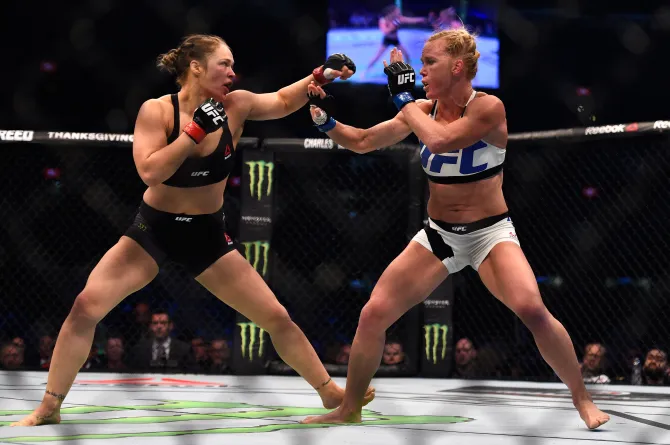
In a candid and deeply personal revelation, Ronda Rousey has shed new light on the mental turmoil she experienced in the lead-up to her devastating knockout loss against Holly Holm at UFC 193. Speaking on a recent platform, Rousey detailed the “self-destructive thoughts” that plagued her after a phone call with UFC President Dana White, painting a picture of an athlete grappling with immense pressure and a crumbling sense of self.
For years, Ronda Rousey was an unstoppable force. The queen of the bantamweight division, she dispatched opponents with terrifying efficiency, her armbar submission becoming her signature and her aura of invincibility seemingly impenetrable. But the pressure that came with that dominance was immense, and as Rousey now reveals, it took a significant toll.
The Weight of Expectation and a Fateful Phone Call
Rousey didn’t mince words when describing the state of mind she was in before stepping into the octagon against Holm. She spoke of the overwhelming expectation to not just win, but to dominate, a pressure that she internalized and allowed to fester. Adding to this already fragile state was a phone call with Dana White, the specifics of which haven’t been fully disclosed, but which Rousey described as triggering a cascade of negative thoughts.
“I was just so f***ing sad,” Rousey confessed, recounting the period leading up to the fight. “I was just like, ‘I don’t want to do this anymore.’ I was having all these self-destructive thoughts.”
This vulnerability offers a stark contrast to the fierce and confident persona Rousey projected to the world. It highlights the often-hidden battles that athletes face, the immense mental strain that accompanies the physical demands of their sport. The phone call with White, whatever its content, seems to have acted as a tipping point, exacerbating Rousey’s existing anxieties and self-doubt.
The Devastating KO and its Aftermath
The fight against Holly Holm is etched in UFC history. The shocking head-kick knockout that ended Rousey’s reign was a seismic moment, not just for the sport, but also for the perception of Rousey herself. Looking back, it’s difficult not to view that fight through the lens of Rousey’s recent revelations. Knowing the mental state she was in, the pressure she was carrying, it adds a layer of understanding to the unexpected outcome.
The aftermath of the loss was brutal for Rousey. The world watched as her invincibility shattered, and the criticism was relentless. Her struggles with the defeat were well-documented, and her honesty about contemplating suicide brought a crucial conversation about mental health in athletes to the forefront.
A Reminder of the Human Element
Rousey’s willingness to share these deeply personal details is a powerful reminder that athletes, despite their superhuman feats, are still human beings with vulnerabilities and emotions. The pressure to perform, the constant scrutiny, and the fear of failure can take a significant toll on their mental well-being.
Her story serves as a cautionary tale about the importance of mental health support for athletes and the need for a more compassionate understanding of their struggles. It also highlights the potential impact of even seemingly small interactions, like a phone call, when someone is already in a fragile state.
Finding Strength in Vulnerability
While the details of Rousey’s experience are undoubtedly painful, her decision to share them is a testament to her strength. By opening up about her “self-destructive thoughts,” she is not only processing her own past but also potentially helping countless others who may be facing similar challenges.
Ronda Rousey’s legacy extends far beyond her wins and losses in the octagon. Her impact on women’s MMA is undeniable, and now, her willingness to be vulnerable and share her struggles adds another layer to her story – a story of resilience, the weight of expectation, and the importance of acknowledging the human side of even the most formidable figures. Her words serve as a powerful reminder that even in the face of devastating loss, there is strength to be found in honesty and vulnerability.